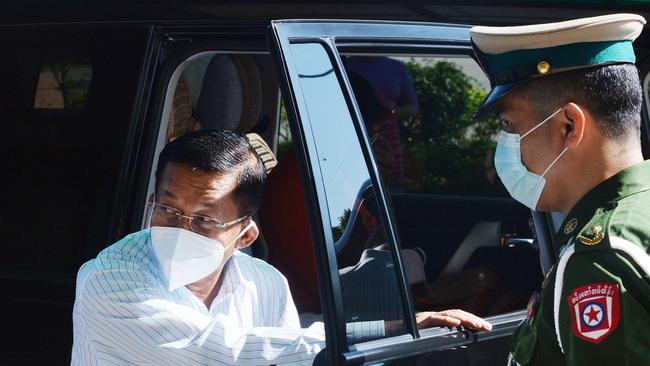High poll turnout puts party of Aung San Suu Kyi on course to victory in Myanmar
Myanmar voters defied predictions of low turnout in polls amid a COVID surge and disillusionment with Aung San Suu Kyi.

Myanmar voters defied predictions of lower turnout in Sunday’s elections amid a COVID-19 surge and disillusionment with Aung San Suu Kyi’s government, coming out in large numbers to support civilian rule in only the second democratic polls in the nation for half a century.
As vote counting continued on Monday, a spokesman for the ruling National League for Democracy said the party’s internal polling showed it had won enough seats to form the next government and was awaiting formal confirmation from the Union Election Commission.
“We have won almost every seat in the (Buddhist-majority) regions,” Myo Nyun told the Frontier Myanmar news site. “We are leading in all of the seats where we won in 2015. Based on the figures from our township offices, we can say that we will be able to form government.”
A higher voter turnout was expected to benefit the NLD, which swept aside decades of military junta rule in a historic victory in 2015, but had feared a combination of voter apathy and soaring COVID-19 infections this time could deprive it of the two-thirds parliamentary majority of 322 seats needed to form government.
Some voters cited concerns the army might regain power as motivation for coming out to cast their ballot, perhaps spooked by military commander Min Aun Hlaing last week questioning the integrity of the polls. On Sunday he said he would accept the result.
One man, who asked not to be named after voting in the outskirts of Yangon, said he backed the NLD because he feared the return of the junta. “There are no realistic alternatives other than Aung San Suu Kyi’s party when it comes to challenging the politics of the USDP and the military,” he told the Myanmar Times, referring to the party that governed with military backing from 2011 in the transition from junta rule.
“The NLD is best placed at this stage to deliver minority rights despite its flaws.”
The military chief wasn’t the only one to cast doubt over the polls, however. The UN and some rights groups have also expressed concerns that the UEC decision to cancel the vote in several conflict-hit states meant the election would not be fair.
But on Monday, the Bangkok-based Asian Network for Free Elections congratulated Myanmar voters and the election authority for “making the elections happen despite the challenge of the global pandemic”.
“While the postponements of elections in several areas in the states of Rakhine, Shan, Kachin, Kayin, Mon and Chin and in Bago region have caused the disenfranchisement of over 1.5 million voters, ANFREL hopes that the UEC will set up by-elections in these areas in due time to ensure the rights of these voters are upheld,” it said.
The election was billed as a referendum on the performance of the NLD and Ms Suu Kyi herself, whose reputation as a democracy champion was shattered by her defence of the military over accusations it committed genocide against Rohingya Muslims in Rakhine State. Some 730,000 civilians crossed into Bangladesh fleeing mass gang rape, murder and arson in 2017 and remain there in refugee camps. Neither those Rohingya of voting age in exile, nor those who remain — mostly in internment camps — in Myanmar, were allowed to vote.
That is barely an issue among the Buddhist population, which largely considers Rohingya to be illegal migrants, though the government’s perceived failure to make headway on peace talks with ethnic minority militias or on the economy certainly is.
Myanmar economist Aung Ko Ko said the next government would need to improve the investment climate and do more to ensure economic benefits trickled down to the poor. “Even though we are seeing more shopping centres and urban development in some cities, this lifestyle is out of reach for the grassroots,” he told the Myanmar Times.
Many in Myanmar are also disappointed that the government has not fulfilled its promise to return the military to barracks.
Ms Suu Kyi heads the government as State Counsellor, a position created to circumvent the military-drafted constitution which bans anyone who has foreign family members from running for high office. Her late husband and two sons are British.
That same constitution also reserves 25 per cent of parliamentary seats for soldiers and Myanmar’s three security ministries for military commanders, meaning any civilian government must share power with the army.
That is unlikely to change any time soon given constitutional amendments require the support of more than 75 per cent of MPs.




To join the conversation, please log in. Don't have an account? Register
Join the conversation, you are commenting as Logout